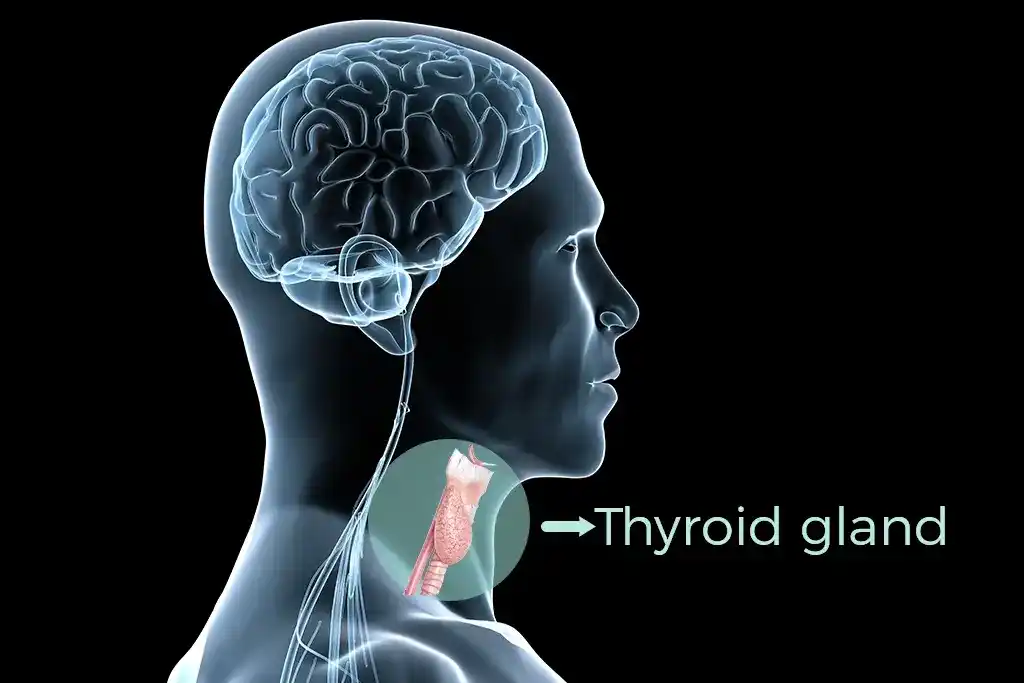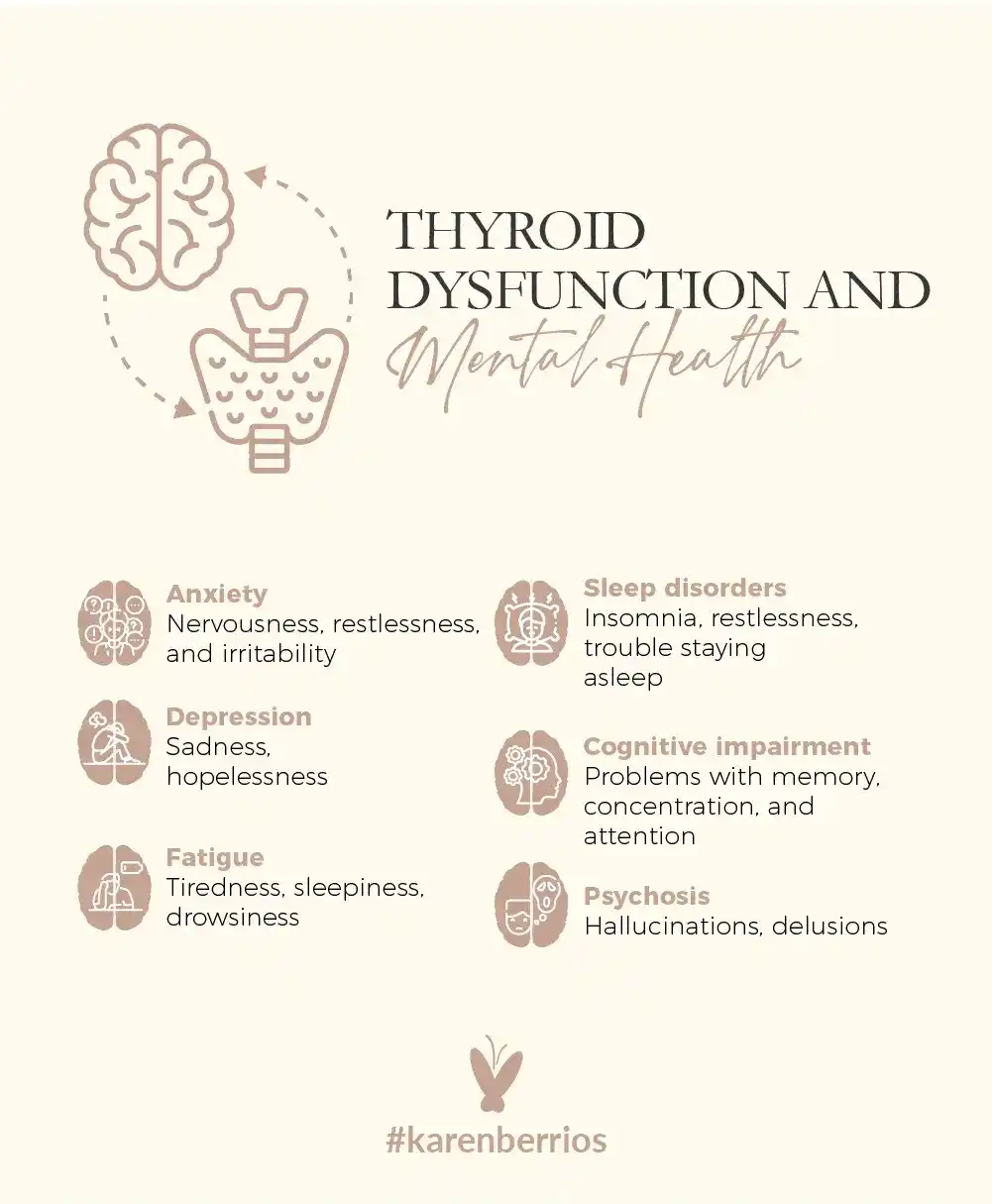

Thyroid Dysfunction and Mental Health
Thyroid Dysfunction. The thyroid is one of the most important glands in the human body with a crucial role of regulating our metabolism. Our fast-paced lifestyles and environmental stressors put a huge toll on its function, making it hard to perform all the actions in an optimal way.
Thyroid dysfunction and a variety of thyroid conditions can have a significant impact on mental health, as the thyroid hormones play a crucial role in regulating mood, cognition, and behavior. Each condition can have a different impact on mental health, but they can also manifest exaclty the same. How severe it will be will depend on various factors, from a person’s age and lifestyle habits to other existing health conditions and the severity of the thyroid dysfunction itself. These negative mental health symptoms can range from mild to severe, with the potential to dramatically impair one’s quality of life.
Hypothyroidism and Mental Health
Hypothyroidism, or an underactive thyroid where the gland doesn’t produce enough thyroid hormones, can have a significant impact on mental health. This is because these thyroid hormones play a crucial role in regulating mood, cognition, and behavior. The most common mental health symptoms associated with hypothyroidism include:
- Depression: Hypothyroidism is often associated with feelings of sadness, hopelessness, and a lack of energy. Low levels of thyroid hormones can affect the production and function of neurotransmitters, such as serotonin, which are important for regulating mood.
- Anxiety: Although more common in hyperthyroidism, hypothyroidism can also lead to feelings of anxiety, nervousness, and restlessness. This may be due to the fact that low thyroid hormone levels can affect the balance of other hormones, such as cortisol and adrenaline, which are involved in the stress response.
- Cognitive impairment: Hypothyroidism can potentially even affect cognitive function, including memory, concentration, and attention. This may be due to a decrease in blood flow to the brain, as well as changes in neurotransmitter function.
- Overwhelming fatigue: People with hypothyroidism usually experience fatigue and a lack of energy, which can make it difficult to carry out daily activities. This can range from mild to severe, and in some cases, make it extremely difficult to function in day-to-day life.
It’s important to note that not all people with hypothyroidism will experience mental health symptoms, and the severity of symptoms can vary widely. However, treatment of hypothyroidism with thyroid hormone replacement therapy can often improve mental health symptoms so it’s important to acknowledge if you’re experiencing any of the abovementioned symptoms. Additionally, your healthcare provider may recommend additional treatments, such as therapy, medication, or alternative options that will work in conjunction with your thyroid treatments.
Hyperthyroidism and Mental Health
Hyperthyroidism, where the thyroid gland is overactive and produces too much hormone, can also have a significant impact on your mental health. The usual symptoms tend to be lead to anxiety, irritability, and nervousness. In severe cases, hyperthyroidism can even lead to psychosis, a condition characterized by delusions and hallucinations. Treatment of hyperthyroidism, which may involve medication, radioactive iodine therapy, or surgery, can also improve mental health symptoms. The most common mental health symptoms associated with hyperthyroidism include:
- Anxiety and depression: Hyperthyroidism can often cause feelings of nervousness, restlessness, and irritability. This may be due to an increase in the production and release of thyroid hormones, which can affect the balance of other hormones, such as cortisol and adrenaline, involved in the stress response. Still, some people experience symptoms of depression too, overlapping with anxiety.
- Mood swings: People with hyperthyroidism may experience sudden changes in mood, including feelings of depression or euphoria.
- Cognitive impairment: Hyperthyroidism can also affect cognitive function, including memory, concentration, and attention. Once again, this may be due to changes in blood flow to the brain, as well as changes in neurotransmitter function.
- Insomnia: Hyperthyroidism can cause difficulty falling or staying asleep, which can lead to fatigue, irritability, and difficulty concentrating during the day.
- Psychosis: In severe cases, hyperthyroidism can lead to psychosis, a condition characterized by delusions and hallucinations, which can have a severe impact on your day-to-day life and overall health.
Like with hypothyroidism, not all people with hyperthyroidism will experience mental health symptoms, and the severity of symptoms can drastically differ from person to person. Treatment of hyperthyroidism, which may involve medication, radioactive iodine therapy, alternative therapies, or surgery, can often improve both physical and mental health symptoms so it’s important to make the connection sooner rather than later.
Thyroid Cancer and Mental Health
Being diagnosed with thyroid cancer can be a very traumatic experience, and it can have a severe impact on mental health. Although it doesn’t come as a surprise and it’s completely understandable to experience a variety of depressive and anxious symptoms, they can sometimes be so severe that you’re unable to live a normal life. This can also have a negative impact on your healing journey, having you lose hope for a positive outcome. Some of the common mental health symptoms associated with thyroid cancer include:
- Anxiety: A thyroid cancer diagnosis can cause feelings of worry, nervousness, and fear about the future, even with a good prognosis.
- Depression: People with thyroid cancer may experience feelings of sadness, hopelessness, and a loss of interest in activities they once enjoyed.
- Fatigue: Treatment for thyroid cancer, such as surgery, radiation therapy, and chemotherapy, can cause fatigue and a lack of energy, which can impact mental health.
- Body image and confidence issues: People with thyroid cancer may experience changes in their appearance due to surgery or radiation therapy, which can affect their self-esteem and body image.
- Cognitive impairment: Treatment for thyroid cancer may even affect cognitive function, including memory, concentration, and attention.
It’s important for people with thyroid cancer to discuss any mental health symptoms with their doctor, as they may recommend additional treatments, such as therapy or medication, to help manage these symptoms. Support groups and counseling can also be helpful for people dealing with the emotional impact of a thyroid cancer diagnosis. It’s important to remember that these mental health symptoms are common and normal, and seeking help can lead to better outcomes and quality of life.
Autoimmune Thyroid Conditions and Mental Health
Additionally, autoimmune thyroid diseases, such as Hashimoto’s thyroiditis and Graves’ disease, have been associated with an increased risk of depression, anxiety, and other mood disorders. The underlying inflammation and autoimmune processes may contribute to these mental health symptoms as well as worsen them over time if not put under control.
Final Thoughts
Thyroid conditions and dysfunctions can have a drastic impact on one’s mental health. And even though not everyone experiences these symptoms, and certainly not in the same capacity or with the same intensity, it’s important to acknowledge them and find a way to deal. It’s also crucial for all healthcare providers to consider the impact thyroid dysfunctions can have on mental health, and to screen for mental health symptoms in patients with thyroid conditions. Treatment of both, thyroid dysfunctions and any associated mental health symptoms can improve the overall quality of life for patients.

hey there
I'm Karen!
I have found my cancer journey to be a positive and profound transformational experience. I’m inspired to share my healing journey here, and trust you’ll find hope, encouragement and purpose as you discover the healing power that lies within you.
Join
The Mailing List!
By signing up for my newsletter, you agree with our Privacy Policy and Terms & Conditions.



